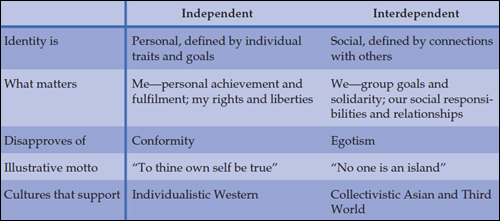|
|

|
Ψ Self Concept
- Who am I? -
|

|
|
Our sense of self
• Click here to go to a suggested list of Core Values for you to consider.
Ψ The ideas & beliefs about yourself become a generalized “Self Schema”.
Ψ A Schema is a template of what we are like & is a model for how we
understand the social world around us. A schema becomes a pattern imposed on complex experiences to simplify, organize
or guide our response.
Schemas
• aid recall.
• direct behavior.
• aid automatic inference.
• speed up processing.
• aid information processing.
Self Reference Effect
Ψ Information relevant to ourselves is processed more quickly & we remember
it better than other information.
Ψ Our focus is on self, we are at the center of our worlds.
Ψ We overestimate how much others focus on us & misperceive that their behavior is
directed toward us or is in response to our behavior, "spotlight effect". There is an “imaginary audience”, especially for adolescents. As we mature realism prevails to some degree.
Ψ We often have the illusion that our emotions are transparent to others. The more self-conscious we are the more we believe this "illusion of transparency".
Ψ The Self & Culture:
Independent or Interdependent.
Worldviews about the self in relation to others differs across & within cultures. Western cultures place particular importance on independence & the expression of one's own attributes (i.e. the self is more important than the group). Asian cultures, however, favor an interdependent view of the self: interpersonal relationships are more important than one’s individual accomplishments, & individuals experience a sense of oneness with the group.

Ψ Durability bias: the tendency to
over predict the duration of affective reactions to future events is touched on but not directly labeled under the heading: Predicting Our Feelings: pages 31 - 33; however, Impact bias is noted: it is the tendency for people to overestimate the length (durability) or the intensity of the impact of future feeling states.
Ψ Dual Attitudes: Our automatic (implicit) attitudes regarding something or someone may differ dramatically from our consciously controlled (explicit) attitudes.
The findings of modern social psychologists seem to support this conclusion. This means that we may not know how we really feel about something or someone, i.e. Self- reports are often untrustworthy. Errors in self understanding
limit the use use of subjective personal reports (e.g. personality inventories).
|

|
|












